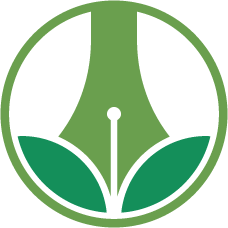Reviews
Nature is My Teacher
Pacific Book Review
Nature is My Teacher is an insightful and enlightening text that will inspire readers. Prabhash Karan uses science and spirituality to explain nature and biology. This book is an expansive text that delves into many topics. Karan writes extensively about nature, climate, and the history of the Universe itself. Karan also writes about how nature is being polluted by deforestation, climate change, and carelessness about nature. He not only writes about nature’s problems, but how to solve them. He advocates using renewable energy and taking action to take care of the Earth. Karan writes about human biology, physical health, and mental health. He writes about the physical life cycle of a human and psychological life of people’s emotions. He details how nature, emotion, and even a person’s diet, are connected to impact people’s lives.
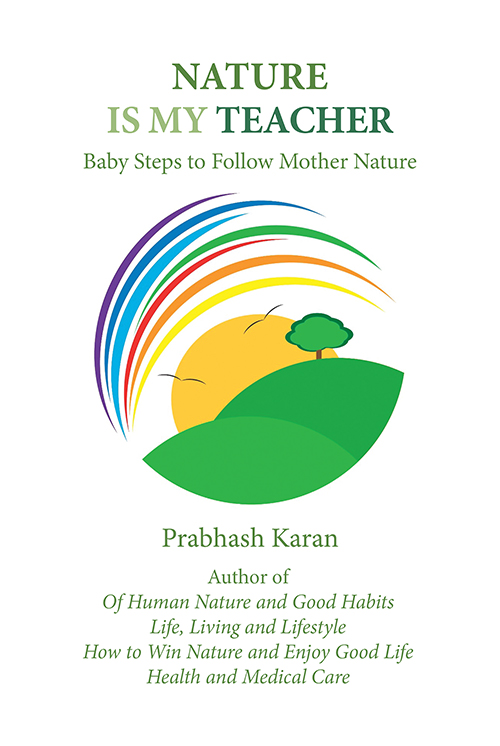
Karan implores readers to fully express their emotions and to take care of their surrounding environments. Nature is My Teacher also advocates for readers to continue to learn and to remember the importance of education to enrich their lives. Nature is My Teacher perfectly combines the scientific and spiritual. Karan writes in great detail about nature and the history of Earth, but also tells moving stories about how growing up in rural India helped him appreciate nature more. He humanizes nature by referring to her as ‘Mother’ and advises readers on how to care for Mother Nature. Karan writes movingly about living peacefully and living in harmony with other people will help readers live their best lives. Nature is My Teacher also advocates for readers to empathize with each other to create inner peace. Additionally, Karan writes about how to treat mental illness not only with medication, but throughout the text is enhanced by diagrams and quotes from philosophers such as Victor Hugo.
Nature is My Teacher would be best for readers who like books that mix science and self-help, like Deepak Chopra’s The Seven Spiritual Laws of Success. Readers of self-help authors like Marianne Williamson’s A Course in Miracles will also gain insight from Karan’s writing. The book could be given out at spiritual and environmental gatherings. The scientific aspects of the book could be taught in university science classes as well. Nature is My Teacher is a book that will inspire readers to take care of themselves and nature. Karan’s wide-ranging book will take readers on an unforgettable spiritual journey.
Premium US Review of Books
“Let nature take its course. The essential idea is not to meddle with nature. Connect nature with your nature. For this, you need not be a philosopher.”
Karan’s voluminous book can be regarded as a grand embrace and celebration of nature, in which the author honors Mother Earth in her entirety, encouraging readers to become intimately acquainted with the natural world. This nearly encyclopedic treatment of living life in harmony with nature is as much philosophy as it is hard science (i.e. human physiology, astrophysics, meteorology, neuroscience, evolutionary biology, chemistry, geology, and the like). Karan also focuses his unique and riveting interpretation of nature through the lenses of anthropology, examining cultures throughout human history, their religious practices, mythologies, politics, technologies; deep environmentalism; and a science-based climate change call-to-action. Finally seeking that which the individual reader cares most about in his or her life, the author offers fierce encouragement for its success.
Consisting of three basic sections—Nature, the Origin of Life, and Human Emotion and Life Experience—Karan’s work explores in impressive detail planet Earth itself, including such phenomena as weather, natural resources, differing ecosystems, the air and water crucial to sustaining life; human evolutionary theory; and the many ways in which we, in the present age, experience stress, anxiety, even depression, resultant primarily from our constant, on-the-move, instant-gratification lifestyles. And yet, the author succeeds in sharing a hopeful vision for overcoming such anxieties, rooted deeply in hope, love, nutrition, education, charity, community, and basic human-kindness. “For today,” writes Karan, “no matter whoever says what, spare your time for the places, events, ideas, people, and activities that make your heart shout loud: ‘Yes!'” The hallmark strength of this book is, quite simply, the sheer enthusiasm the author has in abundance for the subject matter at hand and the many creative ways in which that contagious passion is bestowed as a gift upon the reader. The breadth and depth of that which Karan offers is, indeed, stunning.
Kirkus Reviews
A comprehensive guide to the history and variety of human biology.
In this overview, engineer Karan (Of Human Nature and Good Habits, 2019) takes a largely scientific and analytical look at many aspects of the human body, bringing in elements of basic cosmology and earth sciences as he addresses such topics as birth, growth, and general physiological and psychological health. He gives readers a necessarily concise overview of the development of human life and the workings of evolution by means of natural selection, as well as an examination of the complexities of human reproduction and genetic inheritance. It concludes with a section on emotional development and the key role it plays in life. Earlier, he notes that “We don’t see others as they are; we see them as we feel they are. There is a missing link; trust is the primary missing link in our modern life.” Karan can be just as clear and straightforward in his scientific summaries: “Human development is a dynamic and complex process,” he writes. “The better we understand, the better is our ability to enhance health and well-being both before and after the childbirth.” Nevertheless, it’s wise that he prefaces the text with a disclaimer that the information in his book “does not claim textbook accuracy,” as there are indeed errors, as when he asserts that “science has long taught that human beings are not just another kind of animal,” when science has long taught precisely that, or that people are “programmed to see members of other races as, literally, different beings…that may be trying to annihilate us,” when it’s been amply demonstrated that racism is learned behavior. The book is on far firmer ground, however, when it discusses the specifics of complicated physiological topics, such as pregnancy or adolescence.
A highly readable, if occasionally questionable, scientific overview.
Of Human Nature and Good Habits
Pacific Book Review Star Awarded to Books of Excellent Merit

Prabhash Karan’s book Of Human Nature and Good Habits: Baby Steps to Follow Mother Nature will enable you to be a wholesome person. I understood the Universe better after reading the parts of the book which covered nature and the origin of life. What makes this book stand out from other books in this genre is the author’s ability to have the reader engaged in his discussions.
Prabhash writes about things that the average human can relate to even as he goes further to discuss other deeper subjects. I admired that the author added an Abraham Lincoln quote when he started on Human Nature.
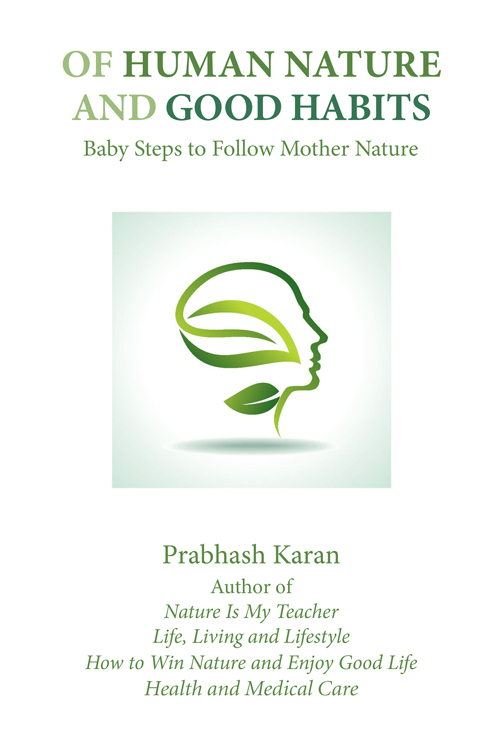

The quote reads “If you look for the bad in people, expecting to find it, you surely will.” This classic Lincoln quote is self-explanatory as it essentially says you will find what you want to find if you keep digging. Through this book, I got to understand why humans value good nature more than authority or any form of treasure. The author defined good nature as qualities that important people have. They include virtues like humility, care, love, patience, bravery, and confidence. The author also writes on the importance of having a good listening ear. Reading this book will have you understand the relationship between one’s DNA, their character and the influence the environment they are in has on them. The surroundings you grow in shape you. Your environment shapes your way of thinking and the perception you have.
I enjoyed reading about the difference between one’s Intelligence Quotient (IQ) and their Emotional Quotient (EQ). Prabhash explained in detail how some people have their IQs raise when they live in certain locations. This book will help you live a simple honest life and have you stay natural at all times. One of my favorite parts in the book was the topic of human emotion and life experience. Some of the topics the author handled hit closer to home, leading me to several moments of self-reflection. The author has encouraging texts for people who are undergoing depression or trying to beat it. Prabhash insisted on the need to focus on positive experiences to avoid sadness and misery. Being around positive energy will help raise your spirits as you face depression.
Of Human Nature and Good Habits is a good read if you are conscious of your mental, environmental and general well-being. The author arranged the topics he discussed systematically, making reading a fun experience. The book can also be classified as motivational because of the nuggets of wisdom in between the pages. One commendable thing about this book is how deep the discussions were. The author not only touched on humans and their characters but also other forces that are part of the universe. You can read this book in bits and still connect the topics.
Premium US Review of Books
“By nature, all humans are alike, but practice sets them apart.”
There is a debate, almost as old as time itself, regarding the primary influence on human behavior and development and whether it is due to nature or the environment (nurture). Karan explores this topic in depth. The author lays the foundation of his thought process by starting with the research and philosophies surrounding the impact that both nature and nurture play in human behavior and development.
The diverse viewpoints are backed up by quotes, widely accepted psychology principles (i.e., Maslow’s hierarchy of needs, introversion vs. extraversion, etc.), and research studies. However, unlike a traditional nonfiction book that uses academia to support a viewpoint, Karan doesn’t cite the research sources that he mentions, making it difficult for a reader to pursue further the academic side of these topics. Nonetheless, this doesn’t detract from the message, or the purpose of presenting this information, which is to guide readers on how to harness the knowledge in a way to make changes to either their outlook on life or lifestyle.
What makes Karan’s work stand out is how he uses nature and nurture principles on classic virtues and habits (such as garnering a balance of patience or increasing happiness) to ones that are applicable for the modern age. A wonderful example of this is in a section called “Mind and Body,” where the modern culture of technology and social networking has influenced both human lifestyle and the general population’s outlook on life. This book will appeal to readers who either want a further understanding of the nature vs. nurture debate or who are looking to change their lives.
Kirkus Reviews
Retired engineer Karan (Health and Medical Care, 2019, etc.) breaks down human behavior and personality in this nonfiction work that’s part of a series on human wellness.
It’s easy to attribute certain tendencies to “human nature,” but what does that phrase actually mean? “By nature, all humans are alike, but practice sets them apart,” Karan explains early in this book. “A loving person loves to live in a loving world, a hostile person in a hostile world, and a monk among the monks.” The author takes the many aspects of human nature—personality, ambition, memory, and even laughter and song—and offers a lengthy discussion on each. He includes references to scientific research, as well as historical perspectives, cultural associations, psychological schemas, and some of his own personal impressions. He begins with the age-old battle of “nature versus nurture,” and Karan’s argument addresses the complexity of humanity itself: the immense power of the natural world, the limits of logic and rationality, and the myriad influences that go into shaping each one of us. Over the course of this book, Karan’s prose is lively and generally authoritative. However, he sometimes lapses into Walt Whitman-esque paeans to Mother Nature that feel a bit out of place: “The treasures hidden in nature are so rich! She makes us rich….We learn from her. Nature is our teacher!” At nearly 500 pages in length, the book is truly wide-ranging, covering everything from the effects of social media on happiness to different therapy strategies to the various types of lying (including “fabrication,” “bluffing,” and “manipulation”). There are plenty of books on this the topic of human nature that might appeal more to a general readership, but readers who are looking a bit more energy and a dash of spiritualism may find Karan’s work to be a good option.
An idiosyncratic but informative volume on why we do the things we do.
Life, Living, and Lifestyle
Pacific Book Review Star Awarded to Books of Excellent Merit





The pursuit of every pleasure is impractical. All that we are, is a result of our thoughts. Know thyself! Lead a good life, a life that is not just happy but purposeful. These words of Prabhash Karan, the author, resonate so well with the information shared in this interesting book.
Life, Living, and Lifestyle: Baby Steps to Follow Mother Nature is the fifth book by this author. It is an incredibly articulate and informative guide about how to live a productive life while following the steps of mother nature.
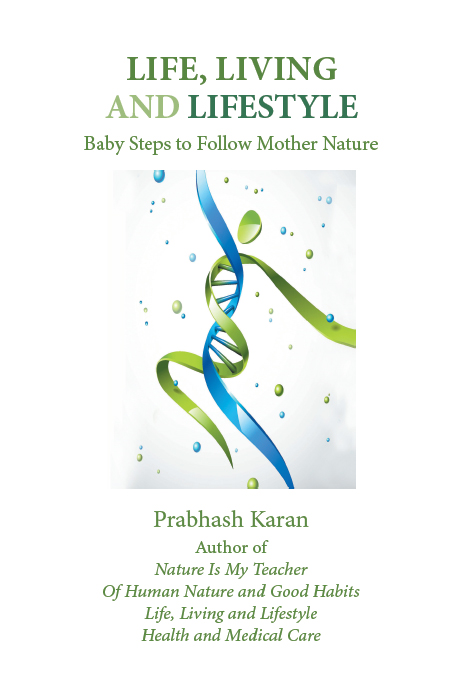

The author explains the connection between humans and nature; that nature is the mother of human beings. She is the reservoir of happiness. The book further explains the genetic programming of human beings accounts for as much as 50 percent of our happiness while 40 percent is dependent on how we cope with adverse situations in our lives. Other factors such as education, finances, marital happiness, and status quo, account for less than 10 percent of our happiness.
The book explains how a slight change in one’s life can make long-lasting restoration in one’s life. The author notes that people want to live lives with instant fulfillment and are controlled so much by the culture of speed and do not stop to pause or recess from the race. Few stop to think about the purpose of life. A small adjustment in lifestyle can make a huge difference and improve our quality of life significantly. Author Prabhash maintains that physical activity is vital to healing. He emphasizes the need to do exercises and their usefulness. He details meticulously the three different intensities of exercises and their positive impact on the body.
The book further deals with lifestyle habits, their hazardous implications on the body, tips on how to quit those habits, and even suggests types of therapy treatments in dire cases. In the latter chapters, the book Life, Living, and Lifestyle: Baby Steps to Follow Mother Nature, discusses topics such as routines and patterns that will prove vital to one’s health, extensively spelling out the functionality of these practices, managing healthy relationships with others, work ethics, the power of etiquette and courtesy, science and technology and its impact in our lives and how to age gracefully.
Admittedly, this book was unquestionably a masterpiece. Any reader of this book can attest to the fact that the research done prior to writing this book was exhaustive. Quotes and references have been used to accentuate the information the writer is sharing with readers. The book is full of life’s lessons. The writer shares tips and principles to help the reader live productively. He has added tables in the pages to simplify the knowledge he intends to impart to the reader. What I liked most about the book is the author’s clear and easy-to-read writing making it effortless for even a layman to understand.
I appreciate the work put into this book. I doff my hat to the author. There is something for everyone in this book regardless of age or maturity. Life, Living, and Lifestyle: Baby steps to follow Mother Nature, is a wonderful resource that can be used for years to come.
US Review of Books
“Mindful meditation! Relaxing through meditation, imagery, or breathing can get the body ready for the rest.”
With the prevalence of mass information consumption, Karan’s work takes the guesswork out of complicated fad diets and warriorlike workout plans. On the contrary, the text promotes an active lifestyle. However, it is emphatic that no matter where one is currently in their lifestyle, staying in the present and reuniting with nature is step one of the baby steps that will ultimately build up to permanent healthy habits.
Like with his other works, the author once again includes useful research from respected sources like the World Health Organization in conjunction with a series of helpful charts that carry the potential to sway doubters. While Karan is adamant that everyone should partake in an active lifestyle of exercise, he also cautions that each individual will have exercises that are suited more to them. Not all will benefit from lifting weights and bodybuilding as much as they would from getting outside and running. His section on yoga is particularly enlightening as it not only sheds light on how popular it has become amongst all groups globally but also its ability to impact the mind, body, and spirit simultaneously.
In addition to discussing the common factors that affect lifestyle, such as weight loss, Karan probes deeper into the more subtle elements that are universally known but rarely understood: sleep quality, personal finance, and quite simply, our demeanor (e.g., whether we can approach even the most difficult situations with a smile). An active lifestyle is critical to aging gracefully. But if one cannot experience proper REM sleep or is routinely mismanaging their finances, it will have ripple effects on the overall lifestyle. With a well-flowing structure and valuable information bursting from every page, Karan’s work is a thought-provoking read with the propensity to spur an awakening within its audience.
RECOMMENDED by the US Review
Kirkus Reviews
A comprehensive guide to living a happy, healthy, and productive life.
In generously detailed chapters, engineer Karan discusses a broad range of health-related issues in this series installment, rather than drilling down at length on one or two. He looks at mental well-being, diet, exercise, and damaging addictions; he also expounds on the virtues of yoga (it “looks easy until you try it,” he quips with complete accuracy), the essence of play, and the achievement of personal balance in the “complex ecosystem” of the human body. The author smoothly combines copious amounts of scientific data with common sense while addressing such subjects as smoking or the questionable benefits of health regimens such as colonic cleansing. However, his focus returns consistently to essentials, and the foremost of these are, of course, diet and exercise. Karan points out low levels of fitness are responsible for a far higher percentage of American deaths than obesity, and that only a quarter of Americans get even moderate exercise, which is defined as a frequency of about 30 minutes at a time, five days a week. Underlying such concerns are deeper issues, such as healthy sleep habits, which the author addresses with a great deal of sensibility and practicality: “Never think that if you don’t fall asleep now, something awful will happen—like you’ll miss your morning flight, have a car accident, or be fired,” he writes. “To avoid these thoughts, ask yourself how many times something like this has actually happened to you.” Karan’s narrative tone is refreshingly frank and sometimes quite pointed, as when he refers to unnecessary hospitalization when one is already near death as “an unethical and immoral tragedy” and “a national disgrace”; this tone gives his insights a good deal of heft.
A sharp and sweepingly inclusive book of advice for improving one’s health.
Clarion Review
Life, Living and Lifestyle is a useful self-help work with suggestions for improving one’s health and personal and professional contentment.
Prabhash Karan’s Life, Living and Lifestyle is a voluminous self-help guide that suggests pausing to enjoy nature, reduce stress, and improve one’s overall health.
Addressing what it calls the key elements of a good life, the book is divided into two sections. Its first half concentrates on active lifestyles and includes discussions of play and exercise, the joy of yoga, weight loss, sleep, and the process of aging gracefully. Its second covers science and technology, organization, personal finances, and one’s habits.
The text has a breathless, energetic quality throughout. It is punctuated by enthusiastic statements and exclamatory remarks. Self-describing as a “good-will guide” and “zeal enhancer,” its imperatives include “Prevent overeating! Practice gratitude!” It acknowledges its inclusion of familiar concepts to improve the quality of one’s daily life. Its work is most distinctive when it chooses to move beyond basic, general recommendations for healthful eating, exercise, and sleep.
Several forthright observations urge deeper reflection, including the perception that “cheap leisure” from mass media outlets leaves the mind vacuous rather than refreshed. Other bold statements involve concerns about artificial intelligence, the lack of privacy in the digital age, and poverty as a “weapon of mass destruction.”
The book’s philosophical commentary is balanced by some attributed research findings, though these are not listed in the form of clear citations. Statistics regarding Americans’ failure to meet minimum exercise recommendations differ in several similar descriptions. Others—about the increased risk of death for women with power at work; and about the doubled or tripled danger of varicose-vein surgery needed for those standing or walking more than six hours a day—are surprising. The book becomes disjointed as it jumps from exploring inadequate preparation for aging populations to the “culture of fast” taking a toll on health and happiness.
The book’s section about remote work and the additional hours involved for telecommuters is valuable and timely. The benefits of exercise are articulated in clearer, more consistent terms; they are a recurring theme in the book. Helpful tips against mindless eating, for smoking cessation, and for work space improvements are shared in plentiful numbers, while the book’s figures and charts, especially those included in upright positions, are easy to read and decipher. However, the book’s typographical errors, missing words, and unusual phrases impede it.
Life, Living and Lifestyle is a useful self-help work with suggestions for improving one’s health and personal and professional contentment.
How to Win Nature and Enjoy Good Life
Pacific Book Review Star Awarded to Books of Excellent Merit





To help the reader understand the content in How to Win Nature and Enjoy Good Life better, author Prabhash Karan divided the book into three parts. The first part talks about love and relationships; the second is about enjoying the good life; and the last part discusses enjoying good food. The topics have been systematically arranged in that the message in the first part helps you understand what is being discussed in the following parts.
The author dominantly dwells on nature and how humans relate to their surroundings. One thing I realized from the beginning of the book is that hate causes more damage than we imagine. ‘Love wins and hate ruins.’
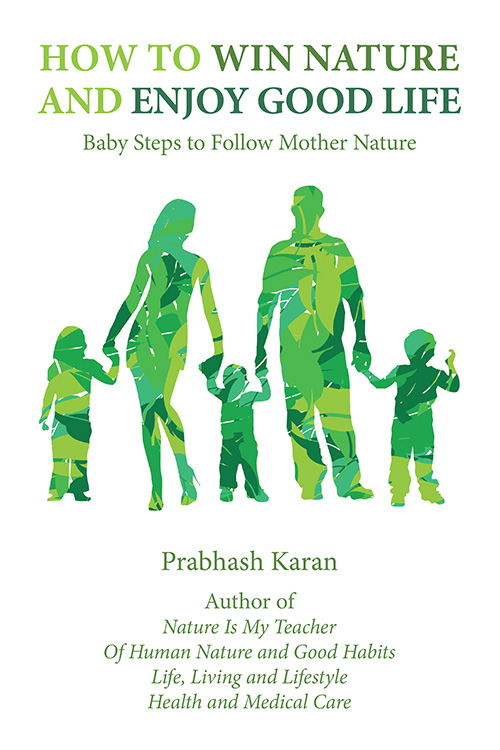

You will be enlightened about culture, health, faith, relationships and the universe at the end of the book. I enjoyed reading about how life came into being and how nature is important for every living being. To the author’s credit is his style of adding as much information as possible when talking about the various subjects. Prabhash Karan uses data and statistics to draw conclusions. Through the data, one can see how the figures given are real and not made up. He also compares life in the beginning and how things have changed today using the same statistics.
This book is about positivity and good vibes. The author teaches about qualities which make one a great person such as kindness, humility, hope, and goodwill. It is important to be kind to people as we need each other to co-exist. The discussion about human emotion and life experience was eye-opening. Prabhash Karan enables the reader to reflect on one’s self, and examine how one has been living. The author has a subtle way of questioning the things you engage in, and how you can make life better.
Reading this book will give you a chance to experience life differently. The author is modest with his words but still manages to pass the message. How to Win Nature and Enjoy Good Life is a bit complex to understand if you pick random subjects but clear if you read it from the start.
To enjoy this book, you need to take a moment and think about how you live your life. The words are engrossing and one is able to take the lessons shared in the book. How to Win Nature and Enjoy Good Life will help you improve your health, better your social life and take care of your mental health. This is a self-help book that is not at all monotonous. The author writes brilliantly, leaving points after covering each subject and tackling issues that affect humans. The book will have you appreciate the beauty of nature and propel you to be conscious of how you
Premium US Review of Books
“Once your life is purpose driven, you can make decisions about allocating your time, energy, talent, and other resources.”
Though medical advances are made constantly, the average life expectancy does not seem to increase. And how is it that people in civilized countries still die at young and middle ages to various diseases and maladies, but people in remote rural areas around the globe routinely live to a century or more? In this book, as in his other work, the author posits that what really leads to a long, healthy, and happy life is a connection with the natural world and the natural order. This guide focuses on three key areas—love, attitude, and diet—in order to help increase wellness, emotional well-being, and physical health. Each piece of advice is meant to be taken individually and mastered before tackling the next, creating a manageable roadmap of directions that anyone can follow in order to rediscover their place in the natural world.
As the subtitle implies, the author of this book doesn’t expect readers to immediately rewrite each of their habitual activities and ways of thinking and make a radical transformation. Certainly, those that give this book their full attention and an open mind may find themselves in a completely different lifestyle by the end of the journey, but the author’s tone is one that is encouraging and realistic about the recommendations and observations that he makes. Almost half of the book is dedicated to dietary adjustments, explaining the benefits derived from a host of natural foods and beverages. Throughout the book are helpful charts, visual aids, and scientific explanations that give the reader background in why certain things that they think might be good for their health are actually working against them. The guidance in this book is both enthusiastic and motivational, inspiring the reader to take even the smallest step toward a healthier and happier life.
Kirkus Reviews
A wide-ranging treatise focuses on the nature of happiness in modern life.
This latest book from Karan (Life, Living and Lifestyle, 2019, etc.) revolves around some fairly straightforward questions: “Are you happy? Why do things feel so good for some people and for others so bad?” In a long series of chapters often buttressed by gleanings from scientific studies, the author seeks to answer such questions on a huge variety of topics, from health and exercise to diet and nutrition and family life and child-rearing. His narrative throughout is well paced, with deeper, more data-heavy elaborations on each subject counterbalanced by short, to-the-point observations. When presenting research findings on the importance of maintaining social ties, for instance, he states simply: “Loneliness kills. It’s the next big public health issue.” A similarly straightforward tone animates his discussion on the evidence of the widespread harm people are doing to themselves by a round-the-clock obsession with cellphones, from degrading their health to erasing their privacy. (Every cellphone, he reminds his readers, is also a tracking device.) Karan gives advice on such age-old parental responsibilities as talking to children about sex as well as more modern issues (dealing with video game addiction, for example). Much of this book delivers clearly reasoned common sense designed to help readers who feel as if their lives are being “consumed in the modern rat race.” But the audience will also encounter passages that are groaningly old-fashioned (Women are believed to be “the embodiment of sweetness and affection”), baffling (The contention, for instance, that “all human physiological reactions so far discovered in the whole universe” amount to about one million), or controversial (“Modern research reveals that innate genetic programming accounts for as much as 50 percent of our happiness”). And some of Karan’s conclusions—lines like “When you feel good, the world feels good with you. Life is beautiful”—feel half-hearted. But it’s a big, full book: Readers will have plenty of picking and choosing to do.
A readable, useful, and detailed examination of the core roots of happiness.
Readers’ Favorite Book Review Mini-Critique 5-Star Rating
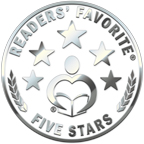

Life is beautiful and Mother Nature is even more beautiful. How To Win Nature and Enjoy Good Life: Baby Steps to Follow Mother Nature by Prabhash Karan is a collection of five books that highlights the beauty of Mother Nature and how she provides the earth with her beauty and grace and breathes life into everyone. We live in times where modern society is always rushing to meet their needs and require instant gratification. This leaves people with little time to understand their purpose in life.
These five books together will give readers comprehensive knowledge about the planet, environment, cosmos, our bodies, jobs, living, and lifestyle. Each book works as a perfect guide and companion for readers, and the author handles the themes with expertise. This book will help readers realize how easy it is to get out of this rut and still live a life of modernity, about good and bad things, how to look into the problem of do’s and don’ts, and make a good life even better. A little adjustment in the way of thinking and getting a lifestyle tuned will make a huge difference in the quality of life. The author’s views will help readers connect better with Nature and give them glimpses of the wonders and beauty that exist around them. The author speaks about a relevant and much-discussed topic in a simple yet authoritative manner, giving awareness on family, marriage, relationships, food habits, diet, and nutrition in a way that will make readers look at the many aspects of life with a new perception and implement the necessary changes for improvement.
Health and Medical Care
Pacific Book Review Star Awarded to Books of Excellent Merit





If recent events have proven anything, it is that the health and care of our civilization is more important than ever before. The need to take a look at the world around us and to not only keep track of our surroundings and the impact they have on our health but to look within ourselves as well has become incredibly powerful and necessary in our world.
As Paracelsus once said, “The art of healing comes from nature, not from the physician. Therefore, the physician must start from nature, with an open mind.”
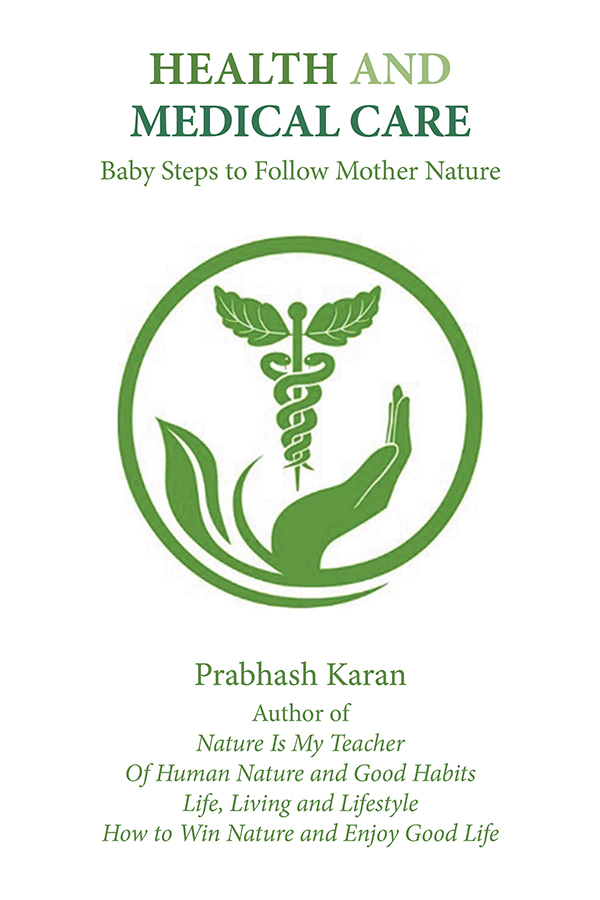

In author Prabhash Karan’s Health and Medical Care, the author dispenses knowledge and basic information about first aid and preventative measures which we all could use for everyday ailments. Focusing on Men’s, Women’s and Children’s medical care, the author explores everything from blood pressure and headaches to arthritis and even cancer, and explores not only the health and science involved in these subjects but how it impacts our happiness and the influence nature and genetics have on all these things.
It is no secret to those living in the United States especially, but to many around the world that health care is not only a vital subject of discussion but is often heavily mishandled and leads to some serious health concerns globally. Just look at the state of the COVID-19 Pandemic for evidence of this. While so many on the front lines are fighting to help those in need every day, world leaders have either jumped forward to find solutions or have dragged their feet at the cost of their citizen’s lives. What the author has done here is present not only a clear-cut and easy to understand how-to guide for health and wellness, but touches immediately upon the fact many healthcare systems are designed to treat the sick only, instead of working to prevent sickness in the healthy as well. The author’s writing is passionate and well backed by research and investigation, making the book’s information feel relevant and easy to digest for the common reader.
This is the perfect read for those who enjoy health and wellness style self-help books that focus primarily on happiness and how mental and emotional wellbeing can have an impact on physical health as well. As someone who has struggled with multiple ailments and a flawed healthcare system, it was fascinating to see the author relate these issues to a more natural and nature-based thought-process, as well as well-documented research to back up the author’s talking points.
A brilliant, insightful and lengthy yet relatable read, author Prabhash Karan’s Health and Medical Care is a must-read non-fiction book. The author presents a clear and understandable book on medicine and health, writing in a way that speaks to the reader and not at the reader, and makes it so the reader must not only absorb the information being presented – but is forced to apply it to their lives as well, making this a one of a kind book to behold.
US Review of Books
“Death and the sun are two things we cannot look at with a steady eye.”
Combining a genuine appreciation for the nurturing elements of Mother Nature with well-researched and comprehensive information on healthcare, Karan’s work consistently advocates for simplistic, holistic living en route to achieving wellness. More than anything else, Karan seeks to educate his readers and an entire society that is consumed by instant gratification in every facet of life, be it in the fast-food industry, technology, etc.
On the surface, the reader may speculate on the text’s simplicity. However, the works’ ability to cater to everyone and meet people at their own level is precisely what makes it intriguing and meaningful. Specifically, Karan’s detailed sections on healthcare for children are eye-opening, especially the portion highlighting the correlation between giving young children antibiotics and childhood obesity. Above all else, though, the author stresses the importance of running and biking, among other activities, to emphasize that all the tools to living our best lives are available within nature.
Karan’s efforts examine health and medical care from all angles, including the vitality of the cognitive and psychological element as it pertains to the American Psychological Association and DSM. By integrating useful charts and statistics that provide further transparency and efficacy in the author’s observations, the work allows audiences to begin surveying the most minute choices they make with their healthcare. Karan delves into everything from dander and pollen allergies and an over-dependence on medication to the environmental impacts on hormonal balance and overall happiness versus stress on cardiac health. The primary takeaway from Karan’s work is unquestionable: if readers seek guidance from nature and apply the baby steps from the text, they will inevitably be on track to rebuild their internal homeostasis and live their lives, outward and inward, in complete synchrony and harmony.
Kirkus Reviews
An extensive book on health and the human body.
Engineer Karan states early in this substantial work, which is part of a series, that “Health is a joy in itself. Enjoy!” He offers information to readers to encourage healthy living, from choices that men can make to minimize the chance of heart disease to ways to manage obesity. However, it also includes a wide swath of material on less-expected topics, such as the fact that cyberbullying can have deleterious effects on children’s health. How do viral infections work? A diagram is provided. How should one lay their baby down to sleep? The author explains a “Back to Sleep” initiative. What can one add to one’s diet that could help lower one’s cholesterol? These appear as a list in a chapter on heart attacks and strokes. Most of the information here includes a reference to a medical study or to expertise from a health-related organization, including the National Stroke Association, the National Center for Health Statistics, and the American Academy of Family Physicians, among many others. What’s the reader to do with this plethora of material? Some of the advice feels like common knowledge, such as urgings to wear a seatbelt; drink alcohol in moderation, if at all; and not to smoke. Despite such obvious points, though, the book tackles all its topics in an invitingly upbeat fashion. Exclamation points appear with some frequency, as in a section on the prevention and treatment of arthritis, in which the reader is encouraged to “keep moving!” The encouraging tone also gives some of the more obscure portions a greater sense of momentum, as in pages explaining lesser-known topics such as CAR-T therapy. In the end, readers are likely to come across at least something they didn’t know before—and it just may help them change their life.
A useful and friendly, if not always groundbreaking, health manual.
Op-Ed
How to Attain Wisdom in Your Life
How to Make a Career Choice
How You Get Success in Life
Tips to Succeed in Life
How Prabhash Karan Has Been Able To Manage Multiple Careers
Why Prabhash Karan Guides Us to Let Mother Nature Take Over
The Effective Guide to Applying Prabhash Karan’s Advice in Your Life
Inspiring Thoughts on Cultivating Positivity in Your Life
Tips on Writing the Most Inspirational Books
Tips on Writing a Motivational Self-Help Book
